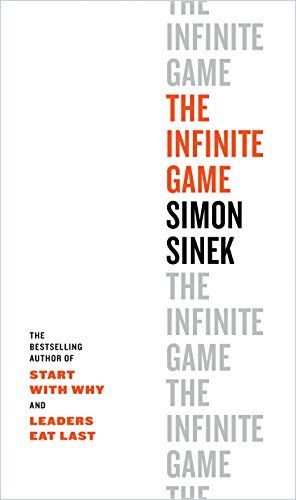A long-term view toward the greater good can inspire your workforce and lift everyone’s commitment.

Beyond Zero-Sum Games
Great leaders set the conditions under which their employees thrive. This includes a psychologically safe and trusting culture where employees enjoy autonomy and security while pursuing a purpose greater than self or money – a purpose that author, motivational speaker and consultant Simon Sinek calls a “Just Cause.”
Most firms chase short-term goals such as being number one, but wise leaders look beyond these zero-sum games. They envision where their organization will be generations ahead – in pursuit of impossible, world-changing goals. Sinek has his own Just Cause, which he defines as making a world in which almost everyone can feel inspired by, safe in and fulfilled by their work.
Engagement
Sinek’s thesis is: Having a long-range perspective focused on the greater good breeds workforce engagement, inspiration and commitment. He recognizes that achieving this goal demands a focused effort with a view to the infinite.
Since 1978, Sinek notes with scorn, CEO compensation has skyrocketed from about 30 times the average worker’s pay to 271 times, a reflection of executive compensation that companies tie to investor returns. Worse, Sinek says, over that time, firms behaved unethically more often, testing the law for their advantage.
When companies make their people feel like they matter, the people come together in a way that money simply cannot buy.Simon Sinek
This behavior creates catastrophes – from job destruction to the Great Recession. That seems to matter little to finite leaders, Sinek explains, since they don’t care about the long-term, their stakeholders or the environment. The author accuses these leaders of seeking only to extract all possible value before they leave. But, Sinek says, even finite-minded leaders know money alone can’t drive engagement. That’s why they craft purpose statements and Corporate Social Responsibility (CSR) programs. Soaring populist movements worldwide reflect workers’ growing disenfranchisement and herald sweeping change. Beyond the necessity of earning revenues and profit, companies must, the author insists, make the workplace psychologically safe by investing in employee development and by being of service.
Play for Longevity
Finite games have fixed rules, beginnings and ends, winners and losers. “Infinite Games” emphasize the journey – the organization’s longevity – not the competition. Sinek observes that, in 2006, Microsoft fixated on “beating” Apple. With a broader, unfettered mind-set, Apple focused, instead, on innovation. Apple worked to fulfill its overarching cause. For a time, Microsoft’s cause was defeating Apple.
Where a finite-minded player makes products they think they can sell to people, the infinite-minded player makes products that people want to buy.Simon Sinek
Sinek argues that a finite mind-set might give a leader a short-term win, but leaders who slash jobs, terrorize their employees, cut R&D, grow by acquisition or use stock buybacks hurt their firms’ long-term prospects. Employees notice these consequences. They may leave, withdraw, disengage, hoard information or collaborate less. The impact, Sinek believes, mounts gradually.
It took more than a decade for Microsoft’s finite-minded CEO Steve Ballmer to change the culture that its infinite-minded founder, Bill Gates, created. As he did, Microsoft’s fortunes fell, bit by bit. Yet, Sinek says, leaders like Ballmer far outnumber leaders like Gates.
Identify your higher cause and make it known.
Sinek writes in very interesting detail about Russian scientist Nikolai Vavilov, who – decades before World War II – began collecting the world’s seeds in his lab. He and his team of scientists amassed hundreds of thousands of seeds to protect Russia and even the rest of the world from famine. Braving cold, bullets, bombardment and starvation, they continued their work. Nine of them starved to death rather than eat their seed stock. Such was their heroic commitment to the greater cause.
Sinek asserts that, like Vavilov, business leaders and their teams need a compelling mission – a Just Cause. His advice is deceptively simple: find your specific cause, write it down and share it with everyone in your firm.
The author offers as the ultimate example the US Declaration of Independence, in which the US Founding Fathers laid out a cause that people rallied around and died for, because it didn’t benefit only themselves or a few others, but everyone. By the way, Sinek says, the founders may have had white men in mind when they wrote that all men are created equal, but the cause of freedom and their core ideals have resonated since, and have expanded to be far more inclusive.
Your organization, Sinek affirms, can develop a specific higher cause, so that it stands for something significant. He cautions that you must make sure your cause has meaning and can endure. Advance the cause, not just the firm. Put forth a vision that can withstand change.
Create conditions for excellence
Sinek proclaims that finite-minded leaders put results ahead of their employees, leading to mass layoffs when a crisis emerges. Infinite-minded leaders put people first. They look at all possible options, such as granting unpaid time off instead of firing people.
It’s not the people doing the job, it’s the people who lead the people doing the job who can make the greater difference.Simon Sinek
The author admires the decision Apple made after it analyzed the costs of hiring new people to replace departing, high-turnover retail employees. Apple found that strong retention efforts – high pay, generous benefits and investments in developing people – cost no more than recruiting and onboarding new people. Costco learned the same lesson. Each has a retention rate of about 90% in retailing, an industry with average annual turnover of between 20% to 30%.
Psychological safety
Sinek offers the tale of former GE CEO Jack Welch, famous for avidly firing people and rating employees on performance and potential. As a counter-example, Sinek admires the way the US Navy SEALS rate candidates and team members on performance and trust. Welch focused on results over culture. The SEALS focus on a culture of trust and psychological safety. The SEALS will let a medium or even low performer who engenders high trust join a team, but they won’t touch a high performer with low trust.
Trust is a positive motivator, while fear is negative. Fear makes people hoard information, resist helping others and lie to avoid punishment. Psychological safety and trust defeat fear. Sinek’s myriad examples show that when people feel free to bring their whole selves to their work, they flourish, share information, collaborate, serve, innovate and solve problems. Fear, mistrust and undue pressure – hallmarks of a weak corporate culture – emphasize rules over relationships. In strong cultures, relationships thrive and provide safety.
Resist “ethical slide”
Bit by bit, good people can slide into doing bad things because, Sinek believes, the rewards seem irresistible despite the possibility of punishment. The way to resist such an “ethical slide” is to build and maintain a strong culture.
The courage to lead is a willingness to take risks for the good of an unknown future.Simon Sinek
Having a true higher cause also makes it easier to stay on course. Lazy leaders contribute to ethical fading by plugging cultural holes with bureaucratic processes instead of trust and relationships. To fuel your continuous improvement, Sinek suggests, study the leaders in your field, understand where they excel and learn from them to fuel your own continuous improvement.
Passion and Pragmatism
Sinek has devoted years to his in-depth study of functional and dysfunctional leaders and companies. Unlike many business writers, he finds that the root of corporate and leadership failures is stunted spiritual, emotional and psychological growth. In this way, he combines his perceptive business observations with a New Age approach to goals, ambition, teamwork and success. It speaks volumes about today’s shifting business environment that Sinek’s positions on these issues now turn out to be pretty much mainstream.
However, you may question his overarching concept that the economy is (or should be) an infinite game instead of a finite game. Apple did not trump Microsoft because of a “just cause.” A football match may be a finite game, because it’s about winning, but a football league is an infinite game, because the players try to stay in the game – which they can do only by winning one finite game after the other. But despite the flaws in his metaphor, Sinek is a keen observer of business and commerce. He grounds his idealistic advice in the practical world of striving to succeed in business, quite usefully adding pragmatism to his passion.
Simon Sinek’s other books include Start With Why: How Great Leaders Inspire Everyone To Take Action and Leaders Eat Last: Why Some Teams Pull Together and Others Don’t.






